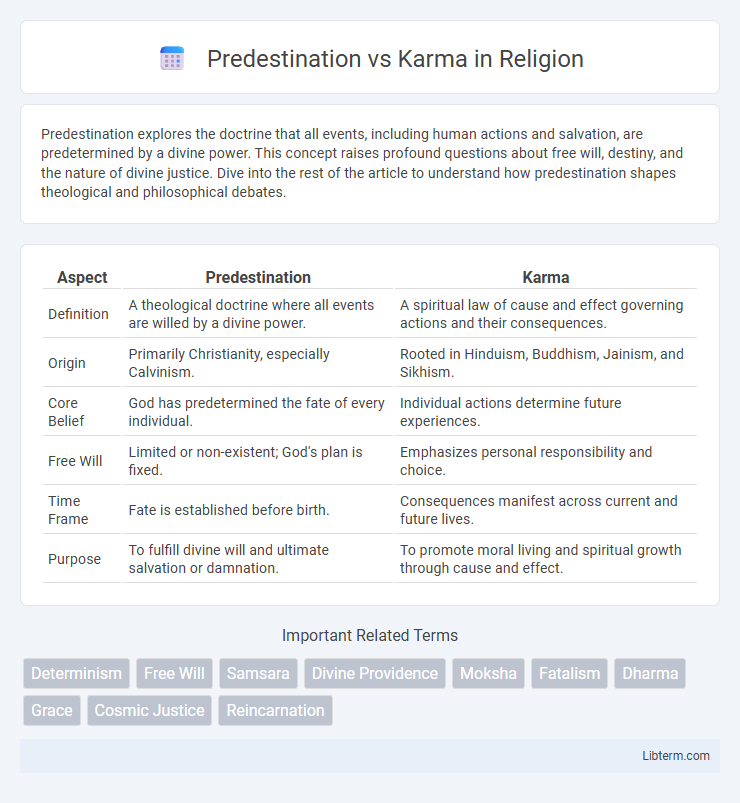Predestination explores the doctrine that all events, including human actions and salvation, are predetermined by a divine power. This concept raises profound questions about free will, destiny, and the nature of divine justice. Dive into the rest of the article to understand how predestination shapes theological and philosophical debates.
Table of Comparison
| Aspect | Predestination | Karma |
|---|---|---|
| Definition | A theological doctrine where all events are willed by a divine power. | A spiritual law of cause and effect governing actions and their consequences. |
| Origin | Primarily Christianity, especially Calvinism. | Rooted in Hinduism, Buddhism, Jainism, and Sikhism. |
| Core Belief | God has predetermined the fate of every individual. | Individual actions determine future experiences. |
| Free Will | Limited or non-existent; God's plan is fixed. | Emphasizes personal responsibility and choice. |
| Time Frame | Fate is established before birth. | Consequences manifest across current and future lives. |
| Purpose | To fulfill divine will and ultimate salvation or damnation. | To promote moral living and spiritual growth through cause and effect. |
Understanding Predestination: Key Concepts
Predestination refers to the theological doctrine that all events, including human actions and ultimate destiny, are predetermined by a divine will or cosmic order. It implies a fixed timeline where free will may be limited or illusory, with outcomes already scripted by an omniscient force. Key concepts include divine omniscience, fate, and the tension between predestined outcomes and moral responsibility.
Defining Karma: Core Principles
Karma, a fundamental concept in Hinduism, Buddhism, and Jainism, refers to the law of moral causation where every action generates corresponding positive or negative effects. It emphasizes ethical living and personal responsibility, suggesting that one's present circumstances result from past actions, and future outcomes depend on current deeds. Unlike predestination, karma operates through dynamic cause-and-effect cycles that continuously shape an individual's spiritual evolution.
Historical Origins of Predestination
Predestination, rooted in early Christian theology, particularly in the teachings of Augustine of Hippo, emphasizes divine sovereignty in determining human salvation and eternal destiny. This concept contrasts with Karma, which originates from ancient Indian religions like Hinduism, Buddhism, and Jainism, where moral actions influence future rebirths and outcomes. The historical origins of predestination shaped Western religious thought by asserting God's predetermined plan, impacting doctrines in Catholicism, Calvinism, and Protestantism.
The Roots and Development of Karma
Karma originates from ancient Indian religions, primarily Hinduism, Buddhism, and Jainism, where it denotes the law of moral causation, stating that an individual's actions directly influence their future experiences. Its development emphasizes a cyclical understanding of life, death, and rebirth, linking ethical behavior to spiritual progression across multiple lifetimes. This concept fundamentally contrasts with predestination, which suggests a fixed divine plan or fate, whereas karma highlights personal responsibility and the dynamic consequences of one's choices.
Predestination in Major World Religions
Predestination is a central doctrine in Christianity, particularly in Calvinism, where it asserts that God has foreordained all events and salvation for a select group of people. In Islam, predestination (Qadar) emphasizes God's absolute knowledge and control over fate, while human free will operates within divine preordination. Some forms of Hinduism and Buddhism acknowledge deterministic elements but predominantly center on karma as the cause-and-effect moral law guiding rebirth, contrasting with the fixed divine decree of predestination.
Karma Across Different Spiritual Traditions
Karma, a fundamental concept in Hinduism, Buddhism, and Jainism, represents the law of cause and effect where one's actions influence future experiences, shaping an ongoing cycle of birth, death, and rebirth (samsara). In Hinduism, karma determines the soul's journey and its progression toward moksha, or liberation, while Buddhism emphasizes karma's role in achieving enlightenment (nirvana) through ethical conduct and mental discipline. Jainism views karma as a subtle matter that adheres to the soul, affecting its purity and spiritual liberation, thus emphasizing non-violence (ahimsa) and deliberate actions to reduce karmic accumulation.
Free Will: Bridging Predestination and Karma
The concept of free will forms a crucial bridge between predestination and karma, highlighting the interplay between destiny and individual actions. In predestination, free will is often viewed as aligned with a divine plan, suggesting that choices ultimately fulfill a predetermined path. Karma emphasizes personal responsibility, where free will enables individuals to create future consequences through intentional actions, offering a dynamic balance between fate and self-determination.
Moral Implications: Accountability and Fate
Predestination posits that all events, including human actions, are predetermined by a divine will, raising questions about moral accountability if individuals lack true free will. Karma, rooted in cause and effect, emphasizes that every action directly influences one's future experiences, reinforcing personal responsibility for ethical behavior. The moral implications of predestination challenge the justice of reward or punishment, while karma inherently supports a system of moral causality and individual consequences.
Modern Perspectives on Fate and Action
Modern perspectives on predestination and karma emphasize the dynamic interplay between predetermined fate and individual agency in shaping life outcomes. Predestination suggests an unchangeable divine plan dictating events, while karma highlights the moral consequences of actions influencing future circumstances. Contemporary thought integrates these concepts by acknowledging both inherent destiny and personal responsibility in navigating life's path.
Comparative Analysis: Predestination vs Karma
Predestination is a theological doctrine asserting that all events and human fates are divinely preordained and unalterable, emphasizing divine sovereignty and predetermined destiny. Karma, rooted in Hinduism and Buddhism, represents a moral causality principle where actions in past lives influence current circumstances, supporting the possibility of spiritual evolution through ethical behavior. While predestination implies a fixed, externally imposed outcome, karma underscores a dynamic, self-driven process of cause and effect shaping future rebirths and experiences.
Predestination Infographic

 libterm.com
libterm.com